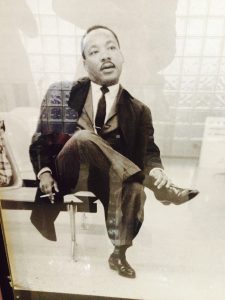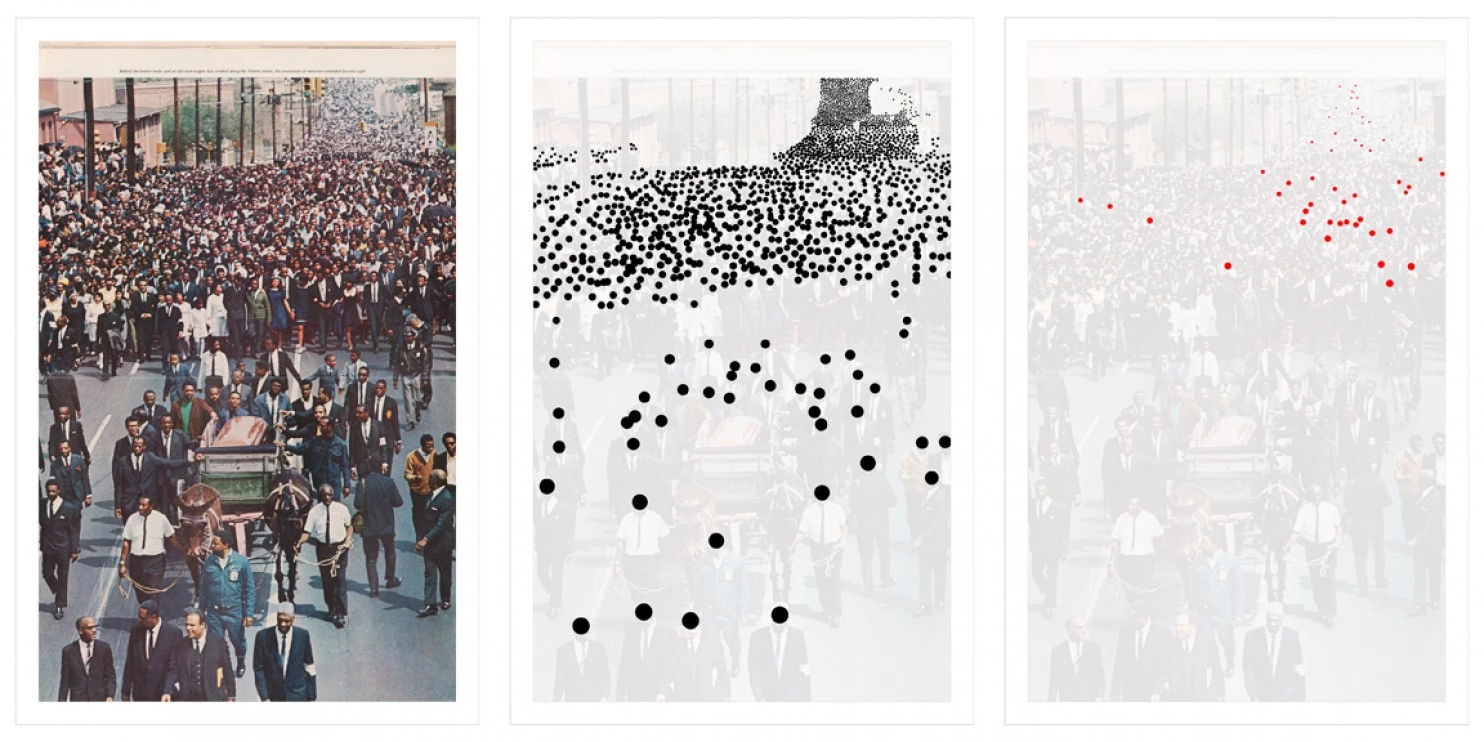 Like smartphones teach us to be dumb – to not know things, to not be able to find our way except by using the device – we are also learning how to forget the past. Or how to remember it inaccurately, disconnected from the forks in the road where our path darkened and we lost something irretrievable, something we did not make nor deserve but that came from us and birthed us, was us, the best and the worst, that pushed us in the right direction because we were scared to go on our own until we learned we could pull ourselves there if we could just join enough hands.
Like smartphones teach us to be dumb – to not know things, to not be able to find our way except by using the device – we are also learning how to forget the past. Or how to remember it inaccurately, disconnected from the forks in the road where our path darkened and we lost something irretrievable, something we did not make nor deserve but that came from us and birthed us, was us, the best and the worst, that pushed us in the right direction because we were scared to go on our own until we learned we could pull ourselves there if we could just join enough hands.
April 4, 1968, the Lorraine Motel, Memphis, TN, the alternately riotous and trippy sixties, the whole twentieth century, came crashing to a sudden end.
Now, 50 years into the 21st we wonder how long it’s going to last. This should not be our mindset; it wasn’t his. Is there an ideal that’s not an ideology? Is there optimism greater than hope?
Can we contemplate the breadth of shared possibility? How much justice will the market allow? The answers are not in your phone.
WE WERE ALL IN LOVE
I would be remiss not to post our new record here. To be widely available, hopefully soon.
On tomorrow’s Anniversary
Early morning, April 4, 1968, a shot rings out in a Memphis sky.
From Garry Wills’ monumental essay:
It is interesting to contrast him with another preacher’s son—James Baldwin. Baldwin became a boy preacher himself as a way of getting out into the secular world. King became a student as a way of getting into a larger world of religion, where the term “preacher” would not be a reproach. He needed a weightiness in his work which only that “Doctor” could give him. He needed it for personal reasons—yes, he had all along aspired to be “De Lawd”—and in order to make Southern religion relevant. That is why King was at the center of it all: he was after dignity, which is the whole point of the Negro rebellion. His talent, his abilities as a “quick study,” his versatility, his years studying philosophy and theology (for which he had no real natural bent) were means of achieving power. His books and degrees were all tools, all weapons. He had to put that “Doctor” before his name in order to win a “Mister” for every Southern Negro. They understood that. They rejoiced in his dignities as theirs. The Nobel Prize didn’t matter except as it helped them. As T.O. Jones put it, “There can never be another leader we’ll have the feeling for that we had for him.”
The Nation’s Racial Divisions at the Time
 Chilean artist Alfredo Jaar produced this work in 1995, and however it hits you will produce the best sketch of your feelings about where we stand as a country, right now, on our continuing struggles with race.
Chilean artist Alfredo Jaar produced this work in 1995, and however it hits you will produce the best sketch of your feelings about where we stand as a country, right now, on our continuing struggles with race.
The artist found it unimaginable that so few whites would attend Dr. King’s funeral:
How could Americans of all racial backgrounds not have mourned the death of the great civil rights leader?
“When I started looking at the shocking absence of white faces, I couldn’t believe it,” Jaar said, “so I started looking for a way to represent this in a graphic and almost funny way. I did not want to preach to people. This was a way for me to express my outrage to what these images reveal.”
How, indeed. In too many ways, the distance between these dots has only grown, even if there are more of them.
Happy Happy New Year
Here’s a cool new thing (to me) for 2014, that I heard on the radio last week.
London Takes Crap Crown
 While often associated with envy, green is also the color of certain kinds of motion sickness. But the opposite of envy is, I guess, pity? A kind of misery? All of these are summed up in the new survey of crappiest towns of Britain, of which London is newly reigning, um, queen?
While often associated with envy, green is also the color of certain kinds of motion sickness. But the opposite of envy is, I guess, pity? A kind of misery? All of these are summed up in the new survey of crappiest towns of Britain, of which London is newly reigning, um, queen?
London was catapulted to victory by multiple nominations for its dismal suburbs, murder miles, high house prices, City bankers and a transport system that abandons late-night revellers to the mercy of rickshaws, minicabs or night buses, “a must for all fans of vomit, paranoid schizophrenics and R&B played through tinny mobile-phone speakers”.
The city’s trump card was undoubtedly its most affluent parish, Mayfair: “Its inhabitants are virtually without exception the biggest shower of needy, self-important bumwipes in London, with a self-pity complex and misplaced sense of entitlement to match. The architecture is either dull west London stucco or a twattish approach at some kind of meaningful landmark building. Either way it’s rubbish. Most importantly the pubs are shit. And full of people who live in Mayfair.”
Who are we to argue? Don’t miss the slideshow that accompanies the article – England at its remarkably dreadfulest. Maybe it’s a sly campaign to get people not to go there. A lot to work with either way.
Away ’13
Tried to upload a photo, but we’re so far away WP doesn’t want to play along.
Just take my word for it, we’re away.
Still Howlin’
Born today in 1910, Mr. Chester Arthur Burnett, who we know better as Howlin’ Wolf. This seems appropriate
2012, R.I.P.
Look back, look ahead. It proves difficult to do with much accuracy, or honesty. We reach for the rose-tinted glasses first, and in this way have learned well.
Humans are fragile, vulnerable, to wreckage of the physical body but vulnerable also to flattery, then to the higher beliefs in our better selves (let’s call them b.s. for short). In part we owe our fellows at least that, and it smoothes the way for beauty, when and wherever it may arise. But it also lays us low for the wiles of corporate propaganda and short-term myth, professionally designed to appeal not to our better selves but the rosier view of our b.s.
When, in the course of human events (love the poetry of that assumption), the consequences of which we now must absolutely extend to the planet, this rosy view becomes the prime facilitator to the shattering – of our environment as well as our human decency – wait: have you ever experienced the horrifying if inconvenient search for glasses that were simply and already perched upon your head? Glasses you may be already wearing can be similarly [mis]placed.
The point is, and it is here somewhere, that we must first realize that we’re wearing the glasses. That is, most of what we see, we view through this filter. Hence appall waits beyond our grasp for a host of terrific insults on our way to the store. How far we had to drive, what we bought, how much it costs, what we do with it, the packaging it came in and what we do with that… the list goes on and on from that one simple trip and much is required to secure the lid that keeps all these questions from ruining our trip. If you cut down on any aspect of the errand, the insults change somewhat. There; we felt the glasses for a moment. Maybe it was enough, maybe I’ll let them slip, even take them off for a while, and re-adjust my vision toward my own, actual b.s.
All the best to you in the New Year, including a sustained view in the direction of your better self.
That Sometimes You Might Believe Anything
 This is the tiny French Village of Bugarach, and according to the hilarious article in the Guardian, it’s going to be the sole survivor of the approaching Mayan Apocalypse:
This is the tiny French Village of Bugarach, and according to the hilarious article in the Guardian, it’s going to be the sole survivor of the approaching Mayan Apocalypse:
“The village has always attracted people with esoteric beliefs, they were here before and they will come afterwards, but this is something quite different,” Delord says. This corner of southern France has long been a cauldron of mystic fables and occult conspiracy theories. Nearby Rennes-Le-Chateau, described in the Cadogan Guide as “the vortex of Da Vinci Code madness”, is famous for its riddles of hidden treasure and a supposed cover-up of Jesus and Mary Magdalene’s married life in France. All around is the countryside of the Cathars, the mysterious and persecuted medieval heretical sect, who have now inspired a local tourism drive. Nostradamus is said to have spent some of his childhood in nearby Alet-les-Bains.
The whole thing is really funny, but don’t miss the comments. Happiest of Thanksgivings to you and yours.
